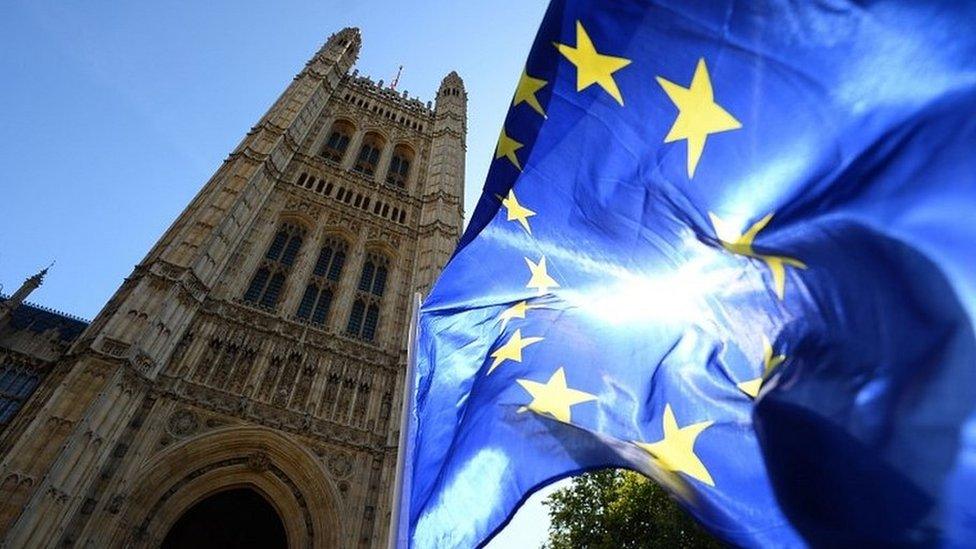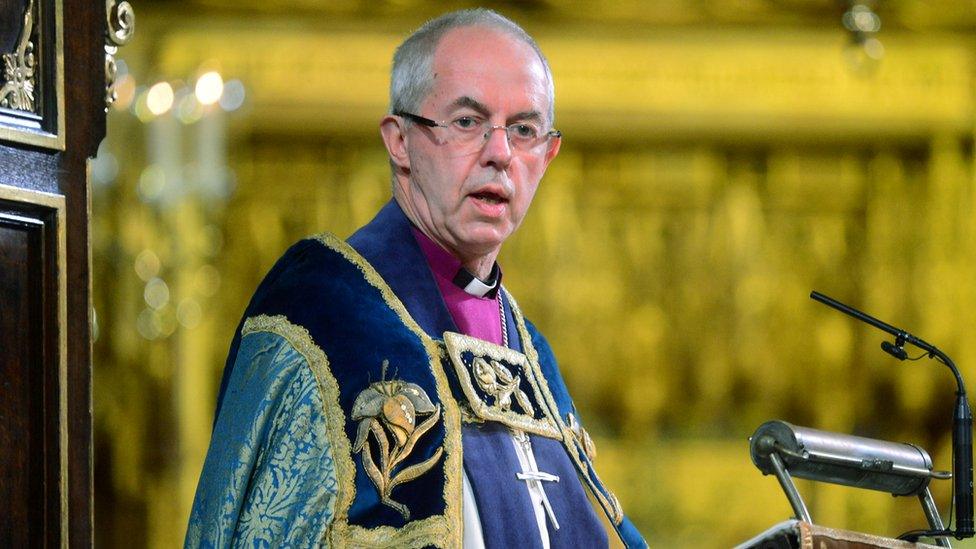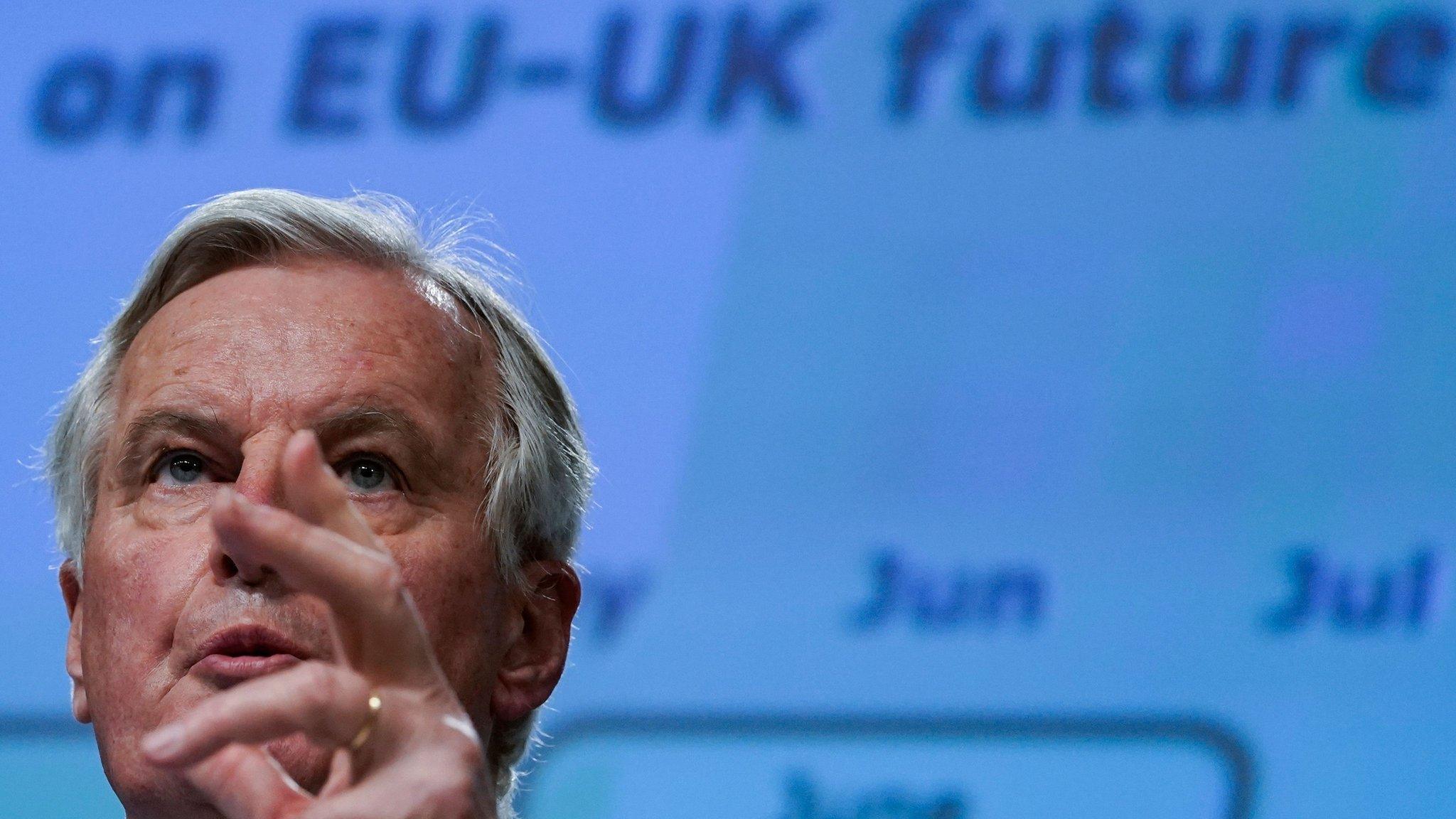Brexit: Anglican leaders issue Internal Market Bill warning
- Published

The leaders of the UK's Anglican Churches have warned the government that its new Brexit bill could set a "disastrous precedent".
The Internal Market Bill could damage the relationship between the UK's four nations, say the archbishops of York and Canterbury and the heads of the Church in Scotland, Wales and Ireland.
It comes as peers have their first say on the legislation.
The bill would allow aspects of the EU Withdrawal Agreement to be superseded.
Northern Ireland Secretary Brandon Lewis told MPs the bill could "break international law in a very specific and limited way".
MPs overwhelmingly backed the Internal Market Bill last month but resistance is expected in the Lords, where Boris Johnson does not have a majority.

The Archbishop of Canterbury Justin Welby, Archbishop of York Stephen Cottrell, Archbishop of Wales John Davies, Archbishop of Armagh John McDowell and the Primus of the Scottish Episcopal Church Mark Strange have written a rare joint letter in the Financial Times, external.
The religious leaders raised concerns about the potential impact the legislation could have on the Good Friday Agreement "on which peace and stability within and between the UK and Ireland depends".

What is the Internal Market Bill?
The bill sets out rules for the operation of the UK internal market - trade between England, Scotland, Wales and Northern Ireland - after the end of the Brexit transition period in January.
It proposes:
No new checks on goods moving from Northern Ireland to Great Britain
Giving UK ministers powers to modify or "disapply" rules relating to the movement of goods that will come into force from 1 January if the UK and EU are unable to reach an alternative agreement through a trade deal
Powers to override previously agreed obligations on state aid - government support for businesses

The archbishops add: "The bill is, of course, not just concerned with domestic law. It currently asks the country's highest law-making body to equip a government minister to break international law.
"This has enormous moral, as well as political and legal, consequences. We believe this would create a disastrous precedent."
A number of Tory MPs have criticised the intervention but Archbishop McDowell told BBC Radio 4's Today church leaders had a role to play in maintaining the "civic dialogue" that was an essential part of a healthy democracy.
"Pretty much every political act, and every piece of legislation or social policy, has an ethical element to it," he said.
The EU has warned the UK it will face legal action if the clauses in the bill relating to checks on goods moving between Northern Ireland and Great Britain and subsidies to Northern Irish businesses are not removed.
Michael Gove: "We hope the EU will change their position"
The government has said it is a necessary "safety net" to protect the UK's internal market in case differences over the Northern Ireland protocol cannot be resolved through the formal resolution process established by the two sides, known as the Joint Committee.
Cabinet Office minister Michael Gove has held talks with EU commissioner Maros Sefcovic to discuss how the legally binding Withdrawal Agreement - which set out the terms of the UK's departure from the EU earlier this year - is being implemented in relation to Northern Ireland and citizen's rights.
He will make a statement to MPs later about the meeting and the chances of the two sides agreeing a trade deal before the UK leaves the single market and customs union on 31 December, when the transition period ends.
The UK and EU are at loggerheads over the terms of their future economic partnership - with talks effectively stalled amid disagreements over fishing access and competition issues.
Speaking on the BBC's Andrew Marr show on Sunday, Mr Gove said the door was "still ajar" for a deal but only if the EU moved ground in key areas.
'Last minute'
The EU's chief negotiator Michel Barnier and his UK counterpart David Frost are due to speak by video link shortly.
Mr Sefcovic told reporters the EU would work "until the last minute" to nail down an agreement but it had to be fair for both sides.
He also said he hoped to resolve all outstanding issues relating to the Withdrawal Agreement in the coming weeks but the time left to do so was "really very, very short".
About 110 peers have signed up to speak during the Second Reading debate of the Internal Market Bill, the first parliamentary hurdle for the legislation during its passage through the Lords.
It is likely to face fierce opposition from Labour, Liberal Democrat and cross-bench peers while several senior Tories, including ex-leader Lord Howard, have said they are unconvinced by the government's promise of a further, specific vote in Parliament before the powers in question can be used.
Lord Judge, the former Lord Chief Justice of England and Wales, has tabled what is called a "motion of regret" which cannot stop the bill but, if passed, would show the level of opposition within the chamber.
Meanwhile, in other related developments, companies have been told to step up preparations so they are not "caught out" by new post-Brexit trade rules.
And International Trade Secretary Liz Truss has chaired the first meeting of a revamped Board of Trade with a panel of advisers including the former Australian prime minister Tony Abbott.
Related topics
- Published30 December 2020

- Published27 February 2020
